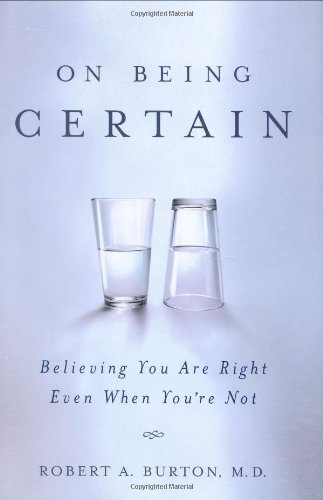What do you think?
Rate this book


272 pages, Hardcover
First published February 5, 2008
Certainty is not biologically possible. We must learn (and teach our children) to tolerate the unpleasantness of uncertainty. Science has given us the language and tools of probabilities. We have methods for analyzing and ranking opinion according to their likelihood of correctness. That is enough. We do not need and cannot afford the catastrophes born out of a belief in certainty. As David Gross, PhD., and the 2004 recipient of the Nobel Prize in physics, said, "The most important product of knowledge is ignorance."
The message at the heart of this book is that the feelings of knowing, correctness, conviction, and certainty aren't deliberate conclusions and conscious choices. They are mental sensations that happen to us.Unfortunately, once one understands this point, the rest of the book is rather less inspiring than promised. Although the discussions concerning the neural basis of experience is well-written, once the author turns to more speculative areas such as evolutionary psychology, religion, or epistemology his arguments rapidly display a lack of rigor and understanding of the fields.
Despite how certainty feels, it is neither a conscious choice nor even a thought process. Certainty and similar states of ‚Äúknowing what we know‚Ä� arise out of involuntary brain mechanisms that, like love or anger, function independently of reason.
I must confess to an underlying agenda: A stance of absolute certainty that precludes consideration of alternative opinions has always struck me as fundamentally wrong. But such accusations are meaningless without the backing of hard science. So I have set out to provide a scientific basis for challenging our belief in certainty. An unavoidable side effect: The scientific evidence will also show the limits of scientific inquiry.
The studies are impressive; once established, emotional habits and patterns and expectations of behavioral rewards are difficult to fully eradicate. This same argument applies to thoughts. Once firmly established, a neural network that links a thought and a feeling of correctness is not easily undone. An idea known to be wrong continues to feel correct.
How different the science-religion controversy would be if we acknowledged that a deeply felt sense of purpose is as necessary as hunger and thirst . . . To expect well-reasoned arguments to easily alter personal expressions of purpose is to misunderstand the biology of belief.
Certainty is not biologically possible. We must learn (and teach our children) to tolerate the unpleasantness of uncertainty.
Not ignorance, but ignorance of ignorance, is the death of knowledge.
---Alfred North Whitehead